|
Enjoy the spectacular railroad journey along Turnagain Arm and across the scenic Kenai Mountains to Seward. The small fishing community is known as the gateway to Kenai Fjords National Park. Arrive in time for a spectacular 6-hour glacier and marine wildlife cruise. Highlights of the Kenai Fjords glacier cruise: Aialik Bay with its massive calving tidewater glaciers, Orca whale watching within Resurrection Bay, a stopover at Chiswell Island known for a large variety of nestling seabirds and at the Steller Sea Lion refuge. You may extend the cruise to the 8.5 hr Northwestern Fjords Cruise where you'll visit three active tidewater glaciers, including the impressive Northwestern Glacier. Discover Alaska by rail on the last full-service railroads in North America - or with one of the privately operated trains. Admire the breathtaking nature in glass-domed or regular rail car compartments - all with large panorama windows ensuring unobstructed views of snowcapped mountain ranges, pristine scenery and wildlife. Relax in your comfortable reclining seats, enjoy a delicious lunch in the onboard restaurant or listen to the local tour guide giving commentaries. Our rail tour packages are available from Anchorage, Seward, Whittier, Talkeetna and Fairbanks. So whether you arrive by air or cruise ship you may choose from an extensive pre-designed selection of tours or use our complimentary trip planning service for a fully customized Alaska rail experience in a world-class destination. |
RR#02 Seward Railroad Tour | Kenai Fjords Cruise Seward
Tour Itinerary
Dates | Rates
Options | Extensions
Accommodation
Railroad FAQ
Kenai Fjords National Park FAQ
|
Day
01 |
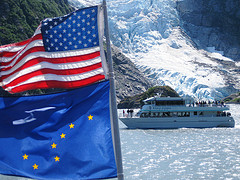 |
Anchorage Upon arrival in Anchorage, check in to your hotel in a prime downtown location. Anchorage features dozens of parks and 122 miles of paved bike paths. Warmed by a maritime climate, you can spend the day with salmon fishing on Ship Creek, hiking the nearby mountains, photographing glaciers and dining at a four-star restaurant. Within a 15-minute drive from downtown on the Hillside is the tree-lined trailhead of Anchorage’s most popular hike, Flattop Mountain. A short floatplane ride opens up the possibility of almost any type adventure. That’s one reason why Anchorage’s Lake Hood is the world’s busiest floatplane base. Try some fresh Alaska seafood (Salmon, Halibut) for dinner in one of the many excellent restaurants around the hotel. Afterwards enjoy a stroll along the Tony Knowles Coastal Trail with sweeping views over the inlet to Mt. Denali and Mt. Susitna aka: "Sleeping Lady". |
|
Day
02 |
 |
Anchorage - Seward Board the legendary Alaska Railroad for a departure at 6.45 am to Seward. The tour offers incomparable vista of fjords, glaciers and mountains as you follow the Cook Inlet/Turnagain Arm, then climb steeply through the coastal mountains to cross Moose Pass. Arrive in Seward at 11.05 am. Transfer to the boat harbour for the 11:30 am full day cruise departure into Kenai Fjords National Park. The 110-mile cruise takes you deep into the park to the Chiswell Islands National Wildlife Refuge. Hosting this cruise is a uniformed National Park Ranger, who will provide narration to your journey and point out the many spectacular sights while fielding any questions you may have. Wildlife is abundant throughout the National Park, and the tidewater glaciers are massive. You'll visit the mighty Holgate Glacier where guests often witness calving - a process by which the glacier sheds giant blocks and slabs of ancient ice - from a close distance. Overnight: Seward |
|
Day
03 |
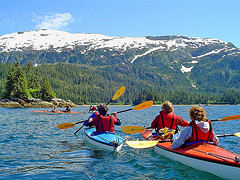 |
Seward - Anchorage Enjoy a full day at leisure in Seward. Seward provides a variety of outdoor activities from fishing to kayaking trips. Don’t miss to visit the Sea-Life Center one of the largest Cold Water Marine Research Institutes in the world. Enjoy some delicious and fresh Alaska seafood (Salmon, Halibut, King Crabs) for lunch on the harbor front. Leave Seward at 6:00 pm for a very scenic rail tour through the Kenai Mountains and along Turnagain Arm to Anchorage. Please note: Due to the very long daylight hours you arrive in Anchorage still during daylight around 10:15 pm. |
| Rates in US $ / per Person | Single | Double | Triple | Quad | Child | |
| May 10 - May 31 | $1191.00 | $808.00 | $699.00 | $645.00 | $219.00 | |
|
|
||||||
| June 1 - August 31 | $1260.00 | $858.00 | $738.00 | $678.00 | $219.00 | |
|
|
||||||
| September 1 - September 25 | $1191.00 | $808.00 | $699.00 | $645.00 | $219.00 | |
| Rates in US $ / per Person | Single | Double | Triple | Quad | Child | |
| May 1 - May 31 | $1446.00 | $1046.00 | $930.00 | $869.00 | $340.00 | |
|
|
||||||
| June 1 - August 31 | $1684.00 | $1187.00 | $1039.00 | $966.00 | $363.00 | |
|
|
||||||
| September 1 - September 25 | $1446.00 | $1046.00 | $930.00 | $869.00 | $340.00 | |
| Daily Departures from May 10 - September 25 |
|
| Rates in US $ | per Person | Adult |
| Seward: Extend Kenai Fjords Cruise to 8.5 Hour Northwestern Fjord Cruise Departure: 9:00 am / Return 5:30 pm |
|
| Seward: Godwin Glacier Helicopter Sled Dog Tour Various Departures, Duration: 90 minutes |
|
| Seward: Real Alaska Day Sightseeing Tour & Dog Sled Ride Duration: 6 Hours, Departure: 11:05 AM / Return 5:15 PM |
|
|
First Class Hotel Category (**** Hotels & Lodges) First Class hotels usually offer additional amenities such as a restaurant, lounge, bar, fireplace seating, fitness room, swimming pool/hot tub, etc. All rooms in First Class hotels belong to a higher category and are always equipped with a private bathroom. Most hotels in this category are usually located in prime locations in prime downtown locations or in national parks. These include larger hotel chains such as: Marriott Hotels, Sheraton, Westmark Hotels, Princess Hotels and Lodges, Clarion Suites, Comfort Inn & Suite. The larger hotel chains are only available in Anchorage and Fairbanks. If a major hotel chain is not available, we prefer to book local premium hotels/deluxe cabins or cottages for our clients. Please note that premium accommodations may not be available in small towns; in such cases we will book the best available accommodation.. 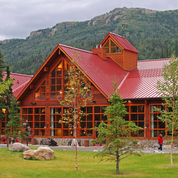 Superior Hotel Category (*** Hotels, Motels & Lodges) Superior Hotels offer a good amount of essential guest services and are located in downtown locations and/or in/near national park areas. All superior class hotel rooms are equipped with a private bathroom. Example larger hotel chains for superior class hotels are: Holiday Inn, Howard Johnson, Guesthouse Inn, Ramada Inn, High Country Inn, Aspen Hotel Group, Comfort Inn. As you might be aware, that these hotel chains are not available throughout Alaska. In such cases or/and when we feel that Alaskan owned hotels & lodges offer a better experience, we go with that choice. Cabins and Cottages also considered in this category to make your experience even more ‘Alaskan’. We ensure that all the Cabins & Cottages have a private bath to make your stay comfortable. 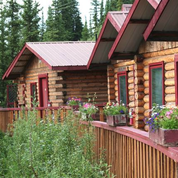 |
 |
| Alaska Rail Tour Services Regular Seating and Private Dome Car Choices Our Alaska Rail Tours are available with the following classes of service: Denali Star & Coastal Classic Regular Service | Many people prefer the standard class for its single level stability, generous seating and the ability to easily walk between different cars on the train. Gold Star Dome Cars Are the newest first-class rail cars in Alaska with large picture windows and fine dining options. Upper level dome car 360-degree viewing seating, priority check in, outdoor viewing deck. The lower level provides a restaurant, bar and gift shop. Midnight Sun Express Dome Cars | These 2-story dome cars with large multiple outside viewing platforms are operated by a private company. Enjoy the full-time 360-degree view dome seating with plenty of leg – and storage room. Additional features are: GPS assisted monitors, restaurant, bar and gift shop. The 1950’s Vintage Cars | The 1950's-era vintage railcars built by the well known Budd Company were some of the last reminders of the Golden Age of rail. A private company began acquiring Budd dome cars for passenger service on the McKinley Explorer train in Alaska. The seven cars the: Matanuska 508, Chena 509, Chulitna 510, Tanana 512, Talkeetna 513, Kashwitna 553 and Eklutna 554 were purchased and completely refurbished. These railcars were to become the most historic and elegant way to travel through America's Last Frontier. Mc.Kinley Explorer Dome Cars | Are the largest domed cars ever build with plenty of legroom, wide isles and additional luggage storage space. The seats are on the upper level – with restaurant, gift shop and bar downstairs - providing a 360-degree view through the glass windows around and the glass dome above you. All seats are wired so you may listen to music and recorded narration. GPS assisted monitors in each car are tracking the exact location. The covered outside viewing platform is a great feature for a breath of fresh air. All Alaska Rail Tours are including a pre-confirmed and assigned seat as well as on-board narration services. MAP – Modified American Plan (Breakfast & Dinner) is available upon request. |
| Children Rate We provide a reduced tour rate for children up to 11 years. Please refer to each individual tour for more information. Children will be accommodated in parents room. |
| Dining The Midnight Sun Express, the McKinley Explorer and the Alaska Railroad Gold Star Dome Cars are offering full service breakfast, lunch and dinner options (all custom made to order) at the on-board restaurants. You will have the opportunity to visit the dining room and order freshly prepared food from the menu. Since all of our dishes are prepared to order we will do our best to accommodate all dietary concerns. Please notify us of any special dietary requirements at the time of reservation. |
| Gratuities Recommended gratuities to the on-board train staff and host guides are $3.00 to $5.00 per person and day. Gratuities for meal and bar service are entirely discretionary, but 15% is customary in most Alaskan restaurants. All tipping is a matter of your individual preference and is of course - always voluntary. |
| Hotel Accommodation For additional information and addresses on hotels, lodges and resorts included in your railroad tour package, please check our „Info Center“ area. |
| Luggage Transfer & Access Passengers are limited to two pieces of checked baggage, not to exceed 50 pounds, that must be checked with the Alaska Railroad without charge. Each passenger may also take one carry on, not to exceed 2 ” by 14” by 17 ”, which will stored under your seat on the viewing level. Please pack any medications, cameras, binoculars or valuables in your carry-on. |
| Pets Are not allowed onboard (except assistance dogs) |
| Smoking Is not permitted on-board the trains. Smoking is allowed outside on the platforms. Ashtrays are available on the outside viewing platform. |
| Sightseeing Tours Most of our tours are including scheduled sightseeing trips. For more information please refer to each individual tour package. In addition to these scheduled tours we also provide a variety of exciting optional sightseeing trips with a great value. Please Note: Optional sightseeing tours are only available in connection with a confirmed rail tour package reservation. |
| Tickets & Travel Documents You’ll receive your boarding passes, travel documents and additional tour information on the departure day at the rail station. Ticketless travel options are available upon request. |
| Transfers Most scheduled transfers indicated within the itinerary are included in our rail tour packages. Optional pre/post hotel tour accommodation are including transfers from/to the airport. Private limousine and/or group coach transfers are available for an additional charge. |
| Wheelchair Access Each train has at least one rail car that this fully accessible to wheelchairs. A specially designed lift makes getting on and off the train easy and safe. There are also accessible restrooms on each of the accessible rail cars. |
| Alaska Rail Tour Travel Destinations Anchorage to Talkeetna | Anchorage is headquarters to the Alaska Railroad and the journey to Fairbanks begins here. Several miles into the trip, the heavy birch forests of Eagle River and Chugiak lead to the Knik and Matanuska Rivers.The expansive watershed harbors wildlife like moose, bear, the occasional wolf and abundant waterfowl. About 40 miles from Anchorage comes the Matanuska Valley, Alaska's agricultural center and home to the towns of Palmer and Wasilla. Just south of Talkeetna, 70 miles further, the first view emerges of Mt. McKinley, North America's highest peak. The train takes its first stop in Talkeetna, a small town with a mining history and now, a popular takeoff point for climbers to Mt. McKinley. Talkeetna to Denali | From Talkeetna, the track follows the serpentine banks of the Susitna River. On clear days, more views of Mt. McKinley emerge across the river presenting many chances for photos. Black and brown bear frequent the sandbars and scuttle into the brush as the train approaches. Next, the Indian River Canyon is home to many beavers and beaver lodges can be seen in the ponds along the way. The track climbs toward tree line, first crossing Hurricane Gulch, the longest bridge on the railroad just over 914 feet and 296 feet above Hurricane Creek. The train moves into Broad Pass, at 2,363 feet it's the highest point on the railroad, and where caribou migrate through during the fall. Thousands of travelers visit Denali National Park and Preserve to see wildlife like wolves, caribou, Dall sheep, moose and bear, and, of course, Mt. McKinley. Denali to Fairbanks | The coal-mining town of Healy follows after a 10-mile jaunt through Healy canyon, where the surging waters of the Nenana River cuts through the steep-sided cliffs. As the track levels out, Nenana comes into view. It is home to one of the remaining original Alaska Railroad Depots, now a museum and gift shop. The track cuts through the northern boreal forests of interior Alaska. Birch, aspen and willow fill this landscape where gold miners first came to seek their fortunes. Fifty-eight miles from Nenana, Fairbanks, the "Golden Heart City" signals the end of the line - but just the beginning for more adventure, culture and history in the Last Frontier. Seward to Anchorage | Your journey starts in Seward, the southern terminus of the railroad. It quickly begins its climb through primeval forests of Sitka spruce. After crossing Snowy River, Kenai Lake comes into view, set off with its stunning aqua color and surrounded by soaring mountains. Moose Pass - Thirty miles into the trip, the track winds through Moose Pass, a former railroad construction camp on the shores of Trail Lake. As the rail ascends into the Kenai Mountains, it leaves behind the forests and reveals mountain meadows and streams of gin-clear glacial waters. Trail Glacier appears on the right and soon after, the summit of Grandview at 1,063 feet and the historic Loop District - named for a complex series of trestles built to handle the steep grade in the age of steam engines. In the same stretch, Bartlett Glacier crowds the track just 800 feet away. Placer River Valley - After passing through a series of short tunnels, the track descends to the Placer River Valley near Spencer Glacier. Moose, bear and wolves populate the valley among the willow and alder trees. Trumpeter swans migrate through in spring and fall and arctic terns hover above the ponds and river looking for small fish and insects. Twelve miles later Turnagain Arm appears, where 40-foot tides rush into the narrow confines of the Chugach Mountains. Beluga whales pursue salmon and other schooling fish. Next comes Girdwood, home to Alaska's premier ski resort, a 40-mile commute from Anchorage. Chugach National Forest - The Chugach National Forest borders Turnagain Arm, some six million acres, the second largest in the U.S. Bald eagles cruise the thermals above and Dall Sheep come to feed on the low plants growing on the cliffs bordering the track. Next comes Potter Marsh in the Anchorage Coastal Wildlife Refuge. Anchorage is the final stop, 114 miles out of Seward. |
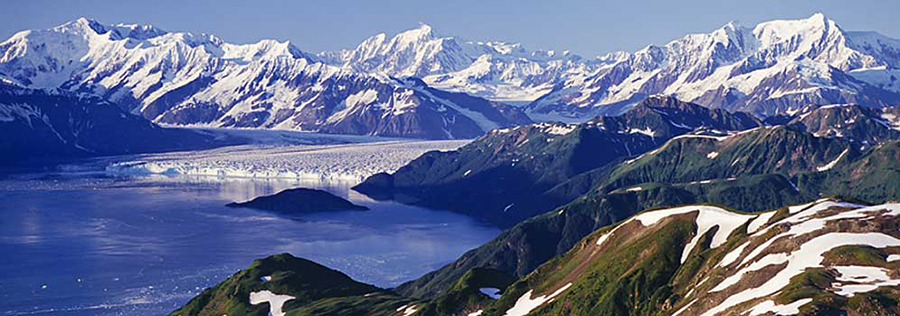 |
|||||||||||||||||||||||||||||||||||||||
Kenai Fjords National Park - FAQ
|
|||||||||||||||||||||||||||||||||||||||